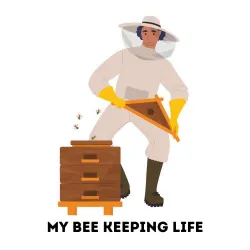
Introduction to Beekeeping for Stress Relief
Are you looking for a unique and natural way to reduce stress? Have you ever considered beekeeping? This might seem like an unusual suggestion, but beekeeping can be a highly effective method of stress relief. In this article, we will explore the concept of beekeeping and its connection to stress relief.
- Understanding the Concept of Beekeeping
- The Connection Between Beekeeping and Stress Relief
Beekeeping, also known as apiculture, is the practice of maintaining bee colonies, usually in hives. This ancient activity dates back to at least 15,000 years ago. Beekeepers care for bees and harvest their honey and other products such as beeswax, pollen, and royal jelly. Beekeeping is not just about collecting honey; it’s also about understanding and respecting the complex life of bees. It requires patience, responsibility, and a deep appreciation for nature.
So, how does beekeeping relate to stress relief? The answer lies in the calming, focused nature of the work. Beekeeping requires a level of concentration that can help distract from daily worries and stress. The repetitive tasks involved, such as inspecting the hives and harvesting the honey, can be meditative and calming. Plus, being outdoors and connecting with nature is a proven stress reliever. According to a study, spending time in green spaces can reduce stress levels, improve mood, and enhance mental wellbeing.
In the following sections, we will delve deeper into the therapeutic effects of bees, the role of bees in natural stress relief methods, a practical guide to stress relief through beekeeping, and the mental health benefits of beekeeping. So, if you’re ready to explore a new, natural method of stress relief, keep reading!
The Therapeutic Effects of Bees
Bees are not just honey producers. They also have therapeutic effects that can help in relieving stress. Let’s delve into how these tiny creatures contribute to stress relief.
How Bees Contribute to Stress Relief
Bees have a unique way of helping us manage stress. Here are two key ways:
- The calming effect of bee buzz
- The therapeutic process of beekeeping
Did you know that the buzzing sound of bees can be calming? It’s true! The gentle, rhythmic hum of a bee’s wings can have a soothing effect on the human mind. This sound can help to slow down our racing thoughts, allowing us to relax and focus on the present moment. It’s like nature’s own version of a mindfulness meditation session!
Beekeeping is not just about harvesting honey. It’s a process that requires patience, attention, and care. As a beekeeper, you need to monitor the health of your bees, ensure they have enough food, and protect them from predators. This process can be therapeutic as it takes your mind off your worries and focuses it on the task at hand. Plus, there’s the added bonus of the sweet reward of honey at the end!
In conclusion, bees and the process of beekeeping can offer therapeutic benefits that help in stress relief. So, the next time you hear a bee buzz, remember, it’s not just a sound, it’s a natural stress reliever!
Bee Therapy for Stress: A Closer Look
Let’s delve deeper into the fascinating world of bee therapy. We will explore how it works and the benefits it can bring to those dealing with stress.
- How Bee Therapy Works
- Benefits of Bee Therapy for Stress
- Reduced Stress Levels: The calming effect of bee products can help to lower stress levels. This can lead to improved mood and overall well-being.
- Improved Sleep: Many people report better sleep after bee therapy sessions. This is likely due to the reduction in stress and anxiety.
- Increased Energy: Bee products like honey and pollen are packed with nutrients that can boost energy levels. This can be particularly beneficial for those dealing with stress-related fatigue.
Bee therapy, also known as apitherapy, is a natural healing method that uses products made by bees, such as honey, pollen, and even bee venom. The process begins with a trained therapist who applies these products to certain parts of the body. The idea is that the natural compounds in these products can have a calming effect on the body and mind.
For example, when bee venom is used, it can stimulate the body’s natural healing response. This can lead to a feeling of relaxation and a reduction in stress levels. It’s important to note that this therapy should only be performed by a trained professional to ensure safety.
Research has shown that bee therapy can have a positive impact on stress levels. Here are some key benefits:
It’s important to remember that while bee therapy can be a helpful tool in managing stress, it should not replace professional medical advice. Always consult with a healthcare provider before starting any new therapy.
| Benefits of Bee Therapy | Description |
|---|---|
| Reduced Stress Levels | The calming effect of bee products can help to lower stress levels, leading to improved mood and overall well-being. |
| Improved Sleep | Many people report better sleep after bee therapy sessions, likely due to the reduction in stress and anxiety. |
| Increased Energy | Bee products like honey and pollen are packed with nutrients that can boost energy levels, particularly beneficial for those dealing with stress-related fatigue. |
Natural Stress Relief Methods: The Role of Bees
When we talk about natural stress relief methods, the role of bees often goes unnoticed. However, these tiny creatures have a significant impact on our mental health. Let’s delve into how bees can help us reduce anxiety and stress.
Bees and Anxiety Relief
Bees, especially honey bees, have a calming effect on the human mind. The buzzing sound they make, their methodical work pattern, and the sweet honey they produce all contribute to anxiety relief. Let’s explore this in detail.
- How bees help reduce anxiety
- Case study: Beekeeping for anxiety relief
Interacting with bees, such as through beekeeping, can be a form of mindfulness practice. The focus required to handle bees safely and effectively can help distract the mind from anxiety-inducing thoughts. Moreover, the rhythmic buzzing sound of bees has a soothing effect, similar to white noise, which can promote relaxation and reduce anxiety.
A study conducted by the University of Sussex found that beekeepers tend to have lower levels of anxiety and stress. Participants reported that the process of beekeeping, from handling the bees to extracting honey, helped them stay focused and calm, thus reducing their anxiety levels.
In conclusion, bees play a significant role in natural stress relief. Their calming presence, the soothing sound they produce, and the rewarding process of beekeeping can all contribute to reducing anxiety. So, the next time you see a bee buzzing around, remember, it’s not just a tiny creature, but a natural stress reliever.
Bees for Relaxation
Bees are not only essential for our ecosystem, but they can also play a significant role in our relaxation and stress relief. Let’s explore how beekeeping can have soothing effects and how you can incorporate bees into your relaxation routine.
- The Soothing Effects of Beekeeping
- How to Incorporate Bees into Your Relaxation Routine
- Beekeeping: Start a small beekeeping project in your backyard. Not only will you be helping the environment, but you’ll also have a relaxing hobby that allows you to connect with nature.
- Observation: If you’re not ready to start beekeeping, consider visiting a local bee farm. Watching bees can be a calming experience, and it’s a great way to learn more about these fascinating creatures.
- Sound Therapy: Listen to the sound of bees buzzing. You can find recordings online or use a sound machine. This can be especially helpful if you’re feeling stressed or anxious.
Beekeeping is a calming activity that can help you unwind and relax. The simple act of observing bees as they go about their daily tasks can be incredibly soothing. It’s a chance to connect with nature and take a break from the hustle and bustle of everyday life.
Moreover, the rhythmic, buzzing sound that bees make has been found to have a calming effect on the human brain. A study conducted by the University of Sussex found that listening to the sound of bees buzzing can significantly reduce stress and anxiety levels. This is because the low-frequency sounds of the bees’ buzzing can enhance the brain’s alpha activity, which is associated with relaxation and tranquility.
Incorporating bees into your relaxation routine can be a rewarding and calming experience. Here are a few ways to do it:
Remember, relaxation is a personal journey. What works for one person may not work for another. But if you’re open to trying new things, you might find that bees can play a significant role in your relaxation and stress relief.
Stress Relief through Beekeeping: A Practical Guide
Are you looking for a unique way to relieve stress? Beekeeping might be the answer. Not only does it provide a connection with nature, but it also offers a sense of accomplishment and purpose. Here’s a practical guide to get you started on your beekeeping journey for stress relief.
Getting Started with Beekeeping
Beekeeping may seem daunting at first, but with the right tools and knowledge, it can be a rewarding experience. Here are some essential steps to get you started:
- Essential tools for beekeeping
- Key steps to start your beekeeping journey
- Education: Learn as much as you can about bees and beekeeping. There are many resources available, including books, online courses, and local beekeeping clubs.
- Choose a Location: Bees need a sunny spot with access to water and flowering plants. Make sure the location is away from high traffic areas.
- Set Up Your Hive: Follow the instructions that come with your hive to set it up. Make sure it’s stable and secure.
- Get Your Bees: You can purchase bees online or from a local beekeeper. They usually come in a package with a queen bee.
- Monitor Your Hive: Regularly check your hive to ensure the bees are healthy and the queen is laying eggs. If you notice any problems, seek advice from experienced beekeepers or a local beekeeping club.
Before you start, you’ll need some basic tools. These include a bee suit to protect you from stings, a smoker to calm the bees, a hive tool for opening the hive, and of course, a beehive. You’ll also need bees, which you can purchase from a local beekeeper or online.
Once you have your tools, you’re ready to start. Here are some steps to guide you:
Beekeeping can be a wonderful stress-reliever, providing a sense of purpose and a connection with nature. As you care for your bees and watch them thrive, you’ll find your own stress melting away. So why not give it a try?
Maintaining Your Beehive for Optimal Stress Relief
Keeping your beehive in top shape is not only essential for the health of your bees, but it can also provide a unique form of stress relief. Let’s explore the regular tasks involved in beekeeping and how they contribute to reducing stress.
- Regular tasks in beekeeping
There are several routine tasks that every beekeeper must perform to ensure the health and productivity of their hive. These include:
| Task | Description |
|---|---|
| Inspection | Regularly inspecting your beehive helps identify any potential issues early. This involves checking the bees’ health, the queen’s presence, and the honey production. |
| Feeding | In times of scarcity, it may be necessary to feed your bees with a sugar syrup to supplement their diet. |
| Harvesting | The sweet reward of beekeeping is harvesting the honey. This usually occurs in late summer or early fall, depending on your location and the health of your hive. |
- How these tasks contribute to stress relief
Engaging in these regular tasks can provide a unique form of stress relief. Here’s how:
- Focus and Mindfulness: Beekeeping requires a high level of focus and attention to detail. This can help you stay present and mindful, which is a proven method for reducing stress.
- Physical Activity: The physical labor involved in maintaining a beehive can serve as a form of exercise, which releases endorphins, the body’s natural stress-relievers.
- Connection with Nature: Spending time outdoors and connecting with nature has been shown to reduce stress levels. Beekeeping allows you to regularly engage with the natural world in a meaningful way.
- Sense of Accomplishment: Successfully maintaining a beehive and harvesting your own honey can provide a great sense of accomplishment, which boosts self-esteem and reduces stress.
In conclusion, the regular tasks involved in maintaining a beehive can offer a unique and effective form of stress relief. So, not only does beekeeping benefit the bees and the environment, but it can also contribute significantly to your mental well-being.
Beekeeping Mental Health Benefits
One of the lesser-known benefits of beekeeping is its positive impact on mental health. The act of caring for bees, observing their behavior, and reaping the fruits of their labor can be a therapeutic experience. Let’s explore the scientific evidence supporting this claim.
Scientific Evidence Supporting Beekeeping for Mental Health
Several research studies have delved into the mental health benefits of beekeeping. Let’s take a closer look at these studies and their key takeaways.
- Research Studies on Beekeeping and Mental Health
- Key Takeaways from the Research
- Beekeeping can reduce stress and anxiety.
- Beekeeping can help combat depression.
- The act of caring for bees and producing honey provides a sense of purpose and accomplishment.
Research has shown that beekeeping can reduce stress and anxiety. A study conducted by the University of Sussex found that beekeepers exhibited lower stress levels compared to those who did not engage in beekeeping. This is believed to be due to the calming effect of watching bees and the satisfaction derived from producing honey.
Another study published in the Journal of Apicultural Research found that beekeeping could help combat depression. The study participants reported feeling happier and more fulfilled after starting beekeeping. The researchers attributed this to the sense of purpose and accomplishment that comes with caring for a colony and producing honey.
The research indicates that beekeeping can have a positive impact on mental health. Here are the key takeaways:
In conclusion, beekeeping is more than just a hobby or a means to produce honey. It can also serve as a form of therapy, providing mental health benefits such as reduced stress and anxiety and improved mood. So, if you’re looking for a new hobby that’s not only enjoyable but also beneficial to your mental health, you might want to consider beekeeping.
Personal Stories: Beekeeping for Stress Relief
-
Case Study: How Beekeeping Changed My Life
Meet John, a 45-year-old accountant who was constantly under stress due to his demanding job. He stumbled upon beekeeping as a hobby and his life took a turn for the better. “Beekeeping has given me a sense of peace and tranquility that I never thought possible,” says John. “The process of caring for the bees, watching them work, and reaping the fruits of their labor in the form of honey has been incredibly therapeutic.”
-
Case Study: Finding Peace in the Buzz
Susan, a 38-year-old teacher, found her stress relief in the hum of the beehive. “There’s something calming about the buzz of the bees. It’s like a natural white noise machine,” she shares. “Beekeeping has taught me patience and the importance of slowing down. It’s my personal form of meditation.”
-
Recap of the Benefits of Bees for Stress Relief
From the personal stories above, it’s clear that beekeeping offers numerous benefits for stress relief. It provides a sense of purpose, teaches patience, and offers a unique form of meditation. Additionally, the physical activity involved in beekeeping can also serve as a form of exercise, which is known to reduce stress levels.
-
Encouragement for Trying Beekeeping as a Stress Relief Method
If you’re searching for a unique way to alleviate stress, consider beekeeping. It’s not just about the honey; it’s about the journey of caring for these remarkable creatures and the peace that comes with it. As John and Susan have shown, beekeeping can truly be a life-changing experience.








